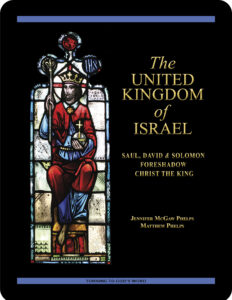 The United Kingdom of Israel:
The United Kingdom of Israel:
Saul, David & Solomon
Foreshadow Christ the King
Lesson 10 Saul Consults a Medium at En-Dor
the First Book of Samuel 28:1—29:11
Revised Standard Version Catholic Edition (RSVCE)*
New American Bible Revised Edition (NABRE)*
Catechism of the Catholic Church
ex libris (in our library)
glossary for The United Kingdom of Israel
cross references in The United Kingdom of Israel
next lesson: David Mourns the Deaths of Saul & Jonathan
This material coordinates with Lesson 10 on pages 62–66 in The United Kingdom of Israel: Saul, David & Solomon Foreshadow Christ the King.
“When your days are fulfilled and you lie down with your fathers, I will raise up your offspring after you, who shall come forth from your body, and I will establish his kingdom. He shall build a house for my name, and I will establish the throne of his kingdom for ever.”
—the Second Book of Samuel 7:12–13
welcome to our in-depth study of Saul, David & Solomon
We invite interested groups and individuals to check out the sample first lesson from this 28- lesson
lesson  Turning to God’s Word Catholic Bible study. These online study pages link to our free lesson videos, as well as to a glossary and cross references in the biblical text. Other study aids include maps, additional commentary, and prayers based on the primary Scripture in each lesson. The United Kingdom of Israel: Saul, David & Solomon Foreshadow Christ the King has been granted an imprimatur and may be purchased from our website shop. If you have a Bible-study question or comment, click on the “ask us your question” or “what do you think” button on any study page.
Turning to God’s Word Catholic Bible study. These online study pages link to our free lesson videos, as well as to a glossary and cross references in the biblical text. Other study aids include maps, additional commentary, and prayers based on the primary Scripture in each lesson. The United Kingdom of Israel: Saul, David & Solomon Foreshadow Christ the King has been granted an imprimatur and may be purchased from our website shop. If you have a Bible-study question or comment, click on the “ask us your question” or “what do you think” button on any study page.
open with prayer
It’s always wise to begin any Bible study with prayer, whether reading the Scriptures alone or meeting with others in a discussion study group. You can pray using your own words or use one of the opening prayers on our website. We especially like the following:
Lord Jesus, you promised to send your Holy Spirit
to teach us all things.
As we read and study your word today,
allow it to touch our hearts and change our lives. Amen.
let’s review—the First Book of Samuel 25:1—27:12
In Lesson 9 David & Abigail; David Again Spares Saul’s Life, Samuel dies and is buried in Ramah. David and his followers move on to the wilderness of Paran where David asks a wealthy man, Nabal of Carmel, for food for his men. Nabal refuses, but his wife Abigail shows hospitality, supplying David’s men with generous amounts of food, an act that prevents David from taking vengeance and killing Nabal. Ten days later, the LORD strikes Nabal dead. David marries Abigail. The Ziphites report David’s presence to Saul, who takes 3,000 men to capture David. David sneaks into Saul’s camp during the night but refuses to harm the LORD’s anointed. Instead, David takes Saul’s spear and leaves Saul sleeping in the camp. After putting some distance between himself and Saul, David accuses Saul’s general Abner of not keeping proper watch over Saul. Saul recognizes David’s voice and announces that David will be successful in many future endeavors. The two separate, but David decides his most prudent course is to avoid further encounters by fleeing to the Philistines. David and 600 followers begin staging raids on neighboring communities for Achish, the Philistine king of Gath. Achish allows David to dwell in Ziklag, along with David’s followers and their families. David and his men avoid raiding any territory occupied by descendants of Jacob. David lies about the places being raided, and he leaves no survivors who might report the truth. Achish believes that David has broken all ties with the descendants of Jacob.
map notes—En-Dor & Gilboa
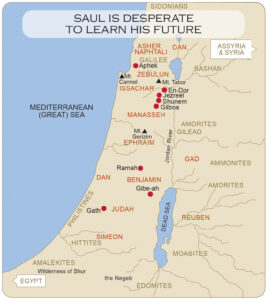 En-Dor, the home of the medium whom Saul consults to call up Samuel’s spirit, is conveniently near Gilboa where Saul’s army has encamped. This mountainous region in territory allotted by God to the half-tribe of Manasseh includes Jezreel and Shunem. It’s also toward the northern edge of territory the descendants of Jacob claim as theirs. This suggests that after Saul banished all the mediums and wizards, the medium at En-Dor may have decided that location was far enough from Saul’s home in Gibe-ah (in territory allotted to the tribe of Benjamin) to provide her with safety. Click on the map (right) to enlarge it. The original map is on page 65 in The United Kingdom of Israel: Saul, David & Solomon Foreshadow Christ the King.
En-Dor, the home of the medium whom Saul consults to call up Samuel’s spirit, is conveniently near Gilboa where Saul’s army has encamped. This mountainous region in territory allotted by God to the half-tribe of Manasseh includes Jezreel and Shunem. It’s also toward the northern edge of territory the descendants of Jacob claim as theirs. This suggests that after Saul banished all the mediums and wizards, the medium at En-Dor may have decided that location was far enough from Saul’s home in Gibe-ah (in territory allotted to the tribe of Benjamin) to provide her with safety. Click on the map (right) to enlarge it. The original map is on page 65 in The United Kingdom of Israel: Saul, David & Solomon Foreshadow Christ the King.
 do you want to know the future? (23:07)
do you want to know the future? (23:07)
Many readers are confused or even disturbed by the account of Saul turning to a  medium to learn what’s going to happen in his upcoming battle. In the video overview for Lesson 10, “Saul Consults a Medium at En-Dor,” Turning to God’s Word author Matthew Phelps discusses what’s going on with Saul, and Matthew addresses the reasons why a preoccupation with knowing the future is a clear signal that we have a problem in our relationship with God. Matthew also talks about
medium to learn what’s going to happen in his upcoming battle. In the video overview for Lesson 10, “Saul Consults a Medium at En-Dor,” Turning to God’s Word author Matthew Phelps discusses what’s going on with Saul, and Matthew addresses the reasons why a preoccupation with knowing the future is a clear signal that we have a problem in our relationship with God. Matthew also talks about  situations in which God chooses to reveal future events. List some potential benefits to knowing what’s going to happen in your life. What might be some of the drawbacks?
situations in which God chooses to reveal future events. List some potential benefits to knowing what’s going to happen in your life. What might be some of the drawbacks?
The Scripture ranges for the videos that accompany this Catholic Bible study from Turning to God’s Word match the Scripture ranges for the sets of questions in The United Kingdom of Israel: Saul, David & Solomon Foreshadow Christ the King. You can follow along as author Matthew Phelps discusses Lesson 10, “Saul Consults a Medium at En-Dor,” on pages 62–66 in the study book.
shared insights—mediums & witches & present-day biblical references
Some translations refer to the medium of En-Dor as a witch. The word medium generally carries fewer negative connotations than the word witch. Both good and bad witches show up in movie and television shows. Both types of witches are depicted in the film “The Wizard of Oz.” The 1960’s television show “Bewitched” featured Elizabeth Montgomery playing the role of a good witch named Samantha. Her character’s mother in this eight-season fantasy series also was a witch—although arguably not quite so good. A participant in one of our study groups has pointed out that Samantha’s mother’s name, Endora, appears to have been inspired by the twenty-eighth chapter of the First Book of Samuel.
urim & thummim don’t always work
The First Book of Samuel 28:6 leaves no doubt that a definite answer wasn’t always obtainable when making an inquiry of God. From this, present-day readers of Scripture can know that using urim and thummim probably wasn’t as simple as tossing dice or throwing a couple of stones on ground. There’s no record of Moses ever using urim and thummim. These aids to divination appear to have been given for the high priest to use when helping those who couldn’t find God’s guidance any other way. The obvious inadequacy of urim and thummim to provide a ready answer to Saul’s inquiries usually is viewed as amounting to the spiritual equivalent of the LORD refusing to return Saul’s calls.
WHAT DO YOU THINK is behind Saul’s desire to speak to Samuel?
With no prophet to turn to for guidance, Saul resorts to occult practices. He asks a medium to call up the spirit of the recently deceased Samuel.
 ? What does this indicate about how Saul regards Samuel’s past counsel?
? What does this indicate about how Saul regards Samuel’s past counsel?
? Consider why Saul now seeks to consult with Samuel after Samuel is dead, since Saul seemed to make a practice of ignoring Samuel’s counsel when Samuel was alive.
? How does Samuel’s spirit appear to feel about being summoned from the dead?
? What does Saul’s desire to talk with Samuel after Samuel’s death suggest about the relative roles of prophet and king?
? Consider whether Saul actually wanted to know what he was told by Samuel’s spirit. What are some disadvantages associated with knowing what’s going to happen in the future?
the conditional nature of Saul’s vocation
Monsignor Ronald Knox was born into the Church of England but later became a Catholic priest. A contemporary of C.S. Lewis and J.R.R. Tolkien, Msgr. Knox wrote detective stories as well as books about the Catholic faith. He was known for his sharp wit and once compared a good sermon to a woman’s skirt—”short enough to arouse interest but long enough to cover the essentials.” About Saul’s failure as king, he wrote these thought-provoking words:
“Perhaps this is one of the most mysterious of all God’s dealings in the economy of grace—that he knows beforehand the history of every soul, knows exactly who will fail him, who won’t manage to rise to the full heights of their vocation; and yet he calls them. Nay, it appears that he has a whole program mapped out for them, of the things they’re meant to do for him, if they’ll only be true to their vocation—though he knows that they won’t. “You have not kept the commandments of the LORD,” Samuel tells Saul; “if you had done thus, the LORD would have established your kingdom over Israel forever.” We know from other references that God had, before this, promised the kingdom to Judah; Saul’s vocation, therefore, was only a conditional one. God knew that Saul would be a failure, and yet he called him to be a success. This is a terrible thing to think about.”
location, location, location
It’s significant that when the medium at En-Dor summons the spirit of the dead Samuel, that spirit makes an entrance by coming up from the earth and not down from heaven. This reflects an important difference between the Old and New Testaments. Heaven isn’t open to mortal men and women until after Jesus’ Passion, death, and Resurrection. Prior to that time, all of the dead go to Sheol. For those who have distinguished themselves serving the LORD, as Samuel undoubtedly has, Sheol is a type of temporary way station where they await entrance to heaven. It sometimes is seen as a type of purgatory. Another area of Sheol more closely resembles what we think of as hell. The Turning to God’s  Word Catholic Bible study The Revelation of Jesus Christ: The Faithful Witness deals with the Christian concepts of heaven, hell, and purgatory as described in the final book of the New Testament.
Word Catholic Bible study The Revelation of Jesus Christ: The Faithful Witness deals with the Christian concepts of heaven, hell, and purgatory as described in the final book of the New Testament.
pray with the Psalms—is God paying any attention?
This is the question that seems to be greatly troubling Saul when he inquires of the LORD about his upcoming  battle with the Philistines. It also appears to be utmost in the mind of the Psalmist when he was writing Psalm 77. “When God Does Not Respond” on page 64 of The United Kingdom of Israel: Saul, David & Solomon Foreshadow Christ the King addresses how this issue affects God’s faithful people in the present day. Prayed at Monday Lauds (Week II), Psalm 77 is included as part of Lesson 18 What God Is As Great As Our God? in the
battle with the Philistines. It also appears to be utmost in the mind of the Psalmist when he was writing Psalm 77. “When God Does Not Respond” on page 64 of The United Kingdom of Israel: Saul, David & Solomon Foreshadow Christ the King addresses how this issue affects God’s faithful people in the present day. Prayed at Monday Lauds (Week II), Psalm 77 is included as part of Lesson 18 What God Is As Great As Our God? in the  Turning to God’s Word Catholic Bible study Sing a New Psalm: Communicating with God Through the Prayers of the Church—Volume I: Lauds & Vespers.
Turning to God’s Word Catholic Bible study Sing a New Psalm: Communicating with God Through the Prayers of the Church—Volume I: Lauds & Vespers.
read the Catechism—is clairvoyance a sin?
The Old Testament treats as permissible forms of divination frowned on by the present-day Church. This doesn’t mean that the Old Testament is endorsing sinful behavior, or that Church teaching is wrong. Paragraph 2116 in the Catechism of the Catholic Church indicates the Church’s clear rejection of clairvoyance along with other forms of divination. The sin associated with clairvoyance for us lies in deliberately using it to look into the future. The Catechism doesn’t directly address the issue of psychic insight that drops unbidden into the head of a person with clairvoyant tendencies. Experiencing such unsought premonitions isn’t in itself a sin. Such premonitions are problematic because they may lead to sin, and there’s always the possibility that they might be the work of the devil.
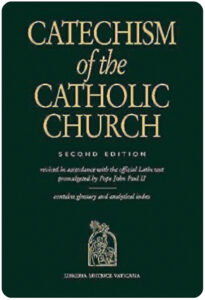 2116 All forms of divination are to be rejected: recourse to Satan or demons, conjuring up the dead or other practices supposed to “unveil” the future. Consulting horoscopes, astrology, palm reading, interpretations of omens and lots, the phenomena of clairvoyance, and recourse to mediums all conceal a desire for power over time, history, and, in the last analysis, other human beings, as well as a wish to conciliate hidden powers. They contradict the honor, respect, and loving fear that we owe to God alone.
2116 All forms of divination are to be rejected: recourse to Satan or demons, conjuring up the dead or other practices supposed to “unveil” the future. Consulting horoscopes, astrology, palm reading, interpretations of omens and lots, the phenomena of clairvoyance, and recourse to mediums all conceal a desire for power over time, history, and, in the last analysis, other human beings, as well as a wish to conciliate hidden powers. They contradict the honor, respect, and loving fear that we owe to God alone.
read the Catechism—use gifts from God wisely
Dealing with unsolicited visions, insights, and premonitions requires discernment, and most Catholics experience difficulty in exercising discernment. Obtaining direction to discern spiritual matters is addressed by the Church in paragraph 2690 in the Catechism of the Catholic Church.
 2690 The Holy Spirit gives to certain of the faithful the gifts of wisdom, faith and discernment for the sake of this common good which is prayer (spiritual direction). Men and women so endowed are true servants of the living tradition of prayer.
2690 The Holy Spirit gives to certain of the faithful the gifts of wisdom, faith and discernment for the sake of this common good which is prayer (spiritual direction). Men and women so endowed are true servants of the living tradition of prayer.
According to St. John of the Cross, the person wishing to advance toward perfection should “take care into whose hands he entrusts himself, for as the master is, so will the disciple be, and as the father so will be the son.” And further: “In addition to being learned and discreet, a director should be experienced…. If a director has no experience of the spiritual life, he will be incapable of leading into it the souls whom God is calling to it, and he will not even understand them.”
death—you could look it up in our archives
 The First Book of Samuel 28:11 records Saul’s request of the medium at En-Dor to call forth the spirit of the dead prophet Samuel. The ancient world viewed death was a time when the spirit left the body. Saul desired counsel from Samuel, so he sought to communicate with Samuel’s departed spirit. Learn more about “death” by reading Lost in Translation, an online column in which Turning to God’s Word author Matthew Phelps helps readers connect with ideas expressed in the original languages of the Scriptures. New Lost in Translation entries are posted on Mondays, and past entries are archived on our website. Contact us if you’d like to receive Lost in Translation by email every week.
The First Book of Samuel 28:11 records Saul’s request of the medium at En-Dor to call forth the spirit of the dead prophet Samuel. The ancient world viewed death was a time when the spirit left the body. Saul desired counsel from Samuel, so he sought to communicate with Samuel’s departed spirit. Learn more about “death” by reading Lost in Translation, an online column in which Turning to God’s Word author Matthew Phelps helps readers connect with ideas expressed in the original languages of the Scriptures. New Lost in Translation entries are posted on Mondays, and past entries are archived on our website. Contact us if you’d like to receive Lost in Translation by email every week.
WHAT DO YOU THINK David might have done in the battle at Gilboa?
David’s service as a vassal to a Philistine king raises some questions to which we have no answers, but they nevertheless are worthwhile to consider.
 ? Consider why David seems so willing to serve a Philistine king.
? Consider why David seems so willing to serve a Philistine king.
? What do you make of the fact that David has allowed Achish to think that he and his men have been raiding Israelite settlements?
? With the Philistines about to embark on a major military campaign against the Israelities, consider what might be behind David’s apparent willingness to fight for the Philistines against his own people.
? What might lead most of the Philistines to insist that David and his men not join in the battle?
? Why do you think Achish is securely confident in David’s loyalty to him?
? Consider what David and his men would have done during the battle had they been permitted to join the Philistines in their attack on the Israelites.
a reminder—Hebrews & Israelites aren’t the same
In the First Book of Samuel 29:3, the Philistine commanders refer to David and his men as Hebrews. While this is technically correct—all of the descendants of Jacob also are descended from Eber, from whom the Hebrews take their name—not all descendants of Eber also are descendants of Jacob. This is because Abraham had other children besides Isaac, and in addition to Jacob, Isaac also fathered Esau. The descendants of Abraham’s son Ishmael and descendants of children born to Abraham’s concubine Keturah, as well as Esau’s descendants, all are Hebrews. While the descendants of Jacob usually distinguish between themselves and other Hebrews, the Philistines don’t make that distinction and refer to all of the descendants of Jacob as Hebrews. God’s covenant with Abraham is through Abraham’s son Isaac, and it passes through Isaac to all of Jacob’s descendants. The Turning to God’s Word Catholic  Bible study In the Beginning: The Book of Genesis includes diagrams of family trees showing the genealogy from Adam and Eve through the immediate descendants of Jacob.
Bible study In the Beginning: The Book of Genesis includes diagrams of family trees showing the genealogy from Adam and Eve through the immediate descendants of Jacob.
 the best Catholic commentary about Scripture
the best Catholic commentary about Scripture
To find out more about how Church teaching is supported by Scripture passages in The United Kingdom of Israel: Saul, David & Solomon Foreshadow Christ the King, check out the Index of Citations in the Catechism of the Catholic Church. Links (Revised Standard Version Catholic Edition [RSVCE*]) to the primary Scripture passages in the lesson and relevant paragraphs in the Catechism are provided here. Not every passage in the biblical text for this Catholic study is referenced in a Catechism paragraph, however.
the First Book of Samuel 28:19—paragraph 633
ways our glossary might prove helpful
In addition to providing extra information about geographical locations, our glossary also points out  persons and places mentioned in the biblical text under multiple names or spellings. If you can remember a name but aren’t sure in which lesson it shows up, you can find it in the glossary, which lists every proper noun that appears in the primary biblical text for The United Kingdom of Israel: Saul, David & Solomon Foreshadow Christ the King.
persons and places mentioned in the biblical text under multiple names or spellings. If you can remember a name but aren’t sure in which lesson it shows up, you can find it in the glossary, which lists every proper noun that appears in the primary biblical text for The United Kingdom of Israel: Saul, David & Solomon Foreshadow Christ the King.
to learn more, read more Scripture
If you’re having difficulty with a particular passage of Scripture, it can be helpful to read the relevant  cross references—but looking these up can take time. To make that easier, we’ve compiled the cross references from the Revised Standard Version Second Catholic Edition (RSV2CE)—the translation that we reprint in our study books. That list can be found at the top of every online study page, and it includes links to cross references in the primary biblical text for The United Kingdom of Israel: Saul, David & Solomon Foreshadow Christ the King.
cross references—but looking these up can take time. To make that easier, we’ve compiled the cross references from the Revised Standard Version Second Catholic Edition (RSV2CE)—the translation that we reprint in our study books. That list can be found at the top of every online study page, and it includes links to cross references in the primary biblical text for The United Kingdom of Israel: Saul, David & Solomon Foreshadow Christ the King.
don’t forget about our indexes & extra online material

 If you’re trying to locate information about a specific Scripture passage, you can look it up in the index at the back of the study book or sample lesson. If you want to find a particular commentary, you can look up its title in the topics index. To learn more about another book of the Bible for which there’s a Turning to God’s Word study, visit the online study directories to read the commentaries and watch any accompanying videos. Finally, if you have a question or would like to make a comment about any of our studies, you can use one of the “ask us your question” or “what do you think” buttons to email our authors.
If you’re trying to locate information about a specific Scripture passage, you can look it up in the index at the back of the study book or sample lesson. If you want to find a particular commentary, you can look up its title in the topics index. To learn more about another book of the Bible for which there’s a Turning to God’s Word study, visit the online study directories to read the commentaries and watch any accompanying videos. Finally, if you have a question or would like to make a comment about any of our studies, you can use one of the “ask us your question” or “what do you think” buttons to email our authors.
ex libris—Church documents & books about religious topics
Link to magisterial documents referred to in our Bible studies at ex libris—magisterial documents.  This listing includes significant recent encyclicals as well as a number of historical Church documents. Recommended books related to Scripture study can be found at ex libris—main bookshelf.
This listing includes significant recent encyclicals as well as a number of historical Church documents. Recommended books related to Scripture study can be found at ex libris—main bookshelf.
wondering how to pronounce some of these words?
The following link is to a reading from the New International Version (NIV) Bible. To listen, click on the audio icon above the printed text. Although not taken from the translations used in our study materials, the NIV reading provides an audio guide to pronunciation of words in this lesson’s primary biblical text. A close online version of the translation of the Bible used in Catholic liturgy in the United States as well as an audio guide for daily Mass readings for the current month can be found on the website of the United States Conference of Catholic Bishops (USCCB).
the First Book of Samuel 28:1—29:11 (NIV)
 close with Bible-based prayer related to this lesson
close with Bible-based prayer related to this lesson
Many of our Catholic study groups like to conclude their discussions with a prayer based on the scriptural focus of their lesson, and some participants include Scripture-specific prayer in their individual study. If you’re uncomfortable composing your own Bible-based prayers you can follow our four easy steps. If you prefer, you can use the following prayer based on the biblical text in this lesson in the study book The United Kingdom of Israel: Saul, David & Solomon Foreshadow Christ the King.
O God, you order all things through divine providence.
Teach us to have confidence in your goodness and mercy,
and to trust in your plan for our well-being
even though we are unable to see into the future.
We ask this in the name of your Son, Jesus Christ,
who is the reason we can hope for eternal life Amen.
Lesson 11 David Mourns the Deaths of Saul & Jonathan—the First Book of Samuel 30:1—Second Book of Samuel 1:27
Lesson 9 David & Abigail; David Again Spares Saul’s Life—the First Book of Samuel 25:1—27:12
you also may like our two-part study of the prophets
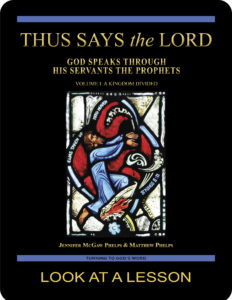
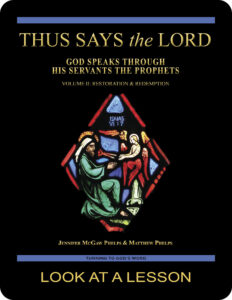 Thus Says the LORD: God Speaks Through His Servants the Prophets—Volume I: A Kingdom Divided examines the prophets in their historical context using the First and Second Books of the Kings and other Old Testament passages written before the Babylonian Exile in 586 B.C. Volume II: Restoration & Redemption looks at the post-exilic prophets. This 51-lesson Catholic Bible study builds on The United Kingdom of Israel: Saul, David & Solomon Foreshadow Christ the King. Click on the books’ covers to view a sample lesson from each volume.
Thus Says the LORD: God Speaks Through His Servants the Prophets—Volume I: A Kingdom Divided examines the prophets in their historical context using the First and Second Books of the Kings and other Old Testament passages written before the Babylonian Exile in 586 B.C. Volume II: Restoration & Redemption looks at the post-exilic prophets. This 51-lesson Catholic Bible study builds on The United Kingdom of Israel: Saul, David & Solomon Foreshadow Christ the King. Click on the books’ covers to view a sample lesson from each volume.
start a Turning to God’s Word Bible study
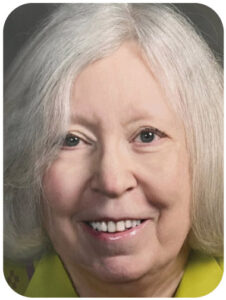 Thank you for your interest in The United Kingdom of Israel: Saul, David & Solomon Foreshadow Christ the King.
Thank you for your interest in The United Kingdom of Israel: Saul, David & Solomon Foreshadow Christ the King.  Information about beginning a Turning to God’s Word Bible study can be found at start a Bible study. Tami, Matthew, and I are available to answer questions. Contact us if you’d like to start one of our studies or have your schedule listed with other TtGW study groups on our website. —Jennifer
Information about beginning a Turning to God’s Word Bible study can be found at start a Bible study. Tami, Matthew, and I are available to answer questions. Contact us if you’d like to start one of our studies or have your schedule listed with other TtGW study groups on our website. —Jennifer
*There are seven deuterocanonical books in the Old Testament—the Books of Tobit, Judith, Wisdom, Sirach, Baruch, and First and Second Maccabees, as well as some passages in the Books of Esther and Daniel. Protestants usually refer to these works as “apocryphal,” a word that means “outside the (Protestant) canon” because they’re excluded from most Protestant Bibles. The word “deuterocanonical” means “second canon”; Catholics use that word to refer to any section of the Catholic Old Testament for which there are no extant, or existing, Hebrew manuscripts. All of the deuterocanonical books appear in the Septuagint, the earliest remaining versions of which date to the 1st century B.C. This Greek translation of the Old Testament was in common use by Jews at the time of Jesus—but the same books aren’t found in existing Hebrew manuscripts, which aren’t as old as the oldest version of the Septuagint. Learn more by reading How Do Catholic & Protestant Bibles Differ?
Turning to God’s Word printed Bible studies use the 2006 Revised Standard Version Second Catholic Edition (RSV2CE) translation for all Scripture references except those to the Psalms, which are taken from The Abbey Psalms and Canticles, prepared by the Benedictine monks of Conception Abbey and published in 2020 by the United States Conference of Catholic Bishops (USCCB). All Scripture links for the online study pages for The United Kingdom of Israel: Saul, David & Solomon Foreshadow Christ the King are to the 1966 Revised Standard Version Catholic Edition (RSVCE) translation. The New International Version (NIV) audio recordings follow the same chapter and verse numbering as the RSV Catholic translations, but the NIV translation doesn’t include the deuterocanonical books and passages.
The 1966 RSVCE uses archaic pronouns and verb forms such as “thee,” “thou,” “didst” in the Psalms and in direct quotations attributed to God. The 2006 RSV2CE replaces those with more accessible English. The few significant translation changes in the RSV2CE include rendering almah as “virgin” in the Book of Isaiah 7:14 and restoring the term “begotten” in the Gospel According to John 3:16.
Numbering varies for some passages in this Bible study. Turning to God’s Word studies (print and digital) follow the numbering in the Revised Standard Version Catholic translations (RSV2CE and RSVCE). Discrepancies in the New American Bible Revised Edition (NABRE) are noted in the Index of Scripture Citations in the study book and the online sample.
 You can learn more about the Psalms by viewing a sample lesson from the Turning to God’s Word Catholic Bible study Sing a New Psalm: Communicating with God Through the Prayers of the Church—Volume I: Lauds & Vespers. The second part of that study, Sing a New Psalm: Communicating with God Through the Prayers of the Church—Volume II: Vigils, Day Prayer & Compline, is scheduled for publication in 2025. Some verse numbers may vary in different translations of the Psalms.
You can learn more about the Psalms by viewing a sample lesson from the Turning to God’s Word Catholic Bible study Sing a New Psalm: Communicating with God Through the Prayers of the Church—Volume I: Lauds & Vespers. The second part of that study, Sing a New Psalm: Communicating with God Through the Prayers of the Church—Volume II: Vigils, Day Prayer & Compline, is scheduled for publication in 2025. Some verse numbers may vary in different translations of the Psalms.
